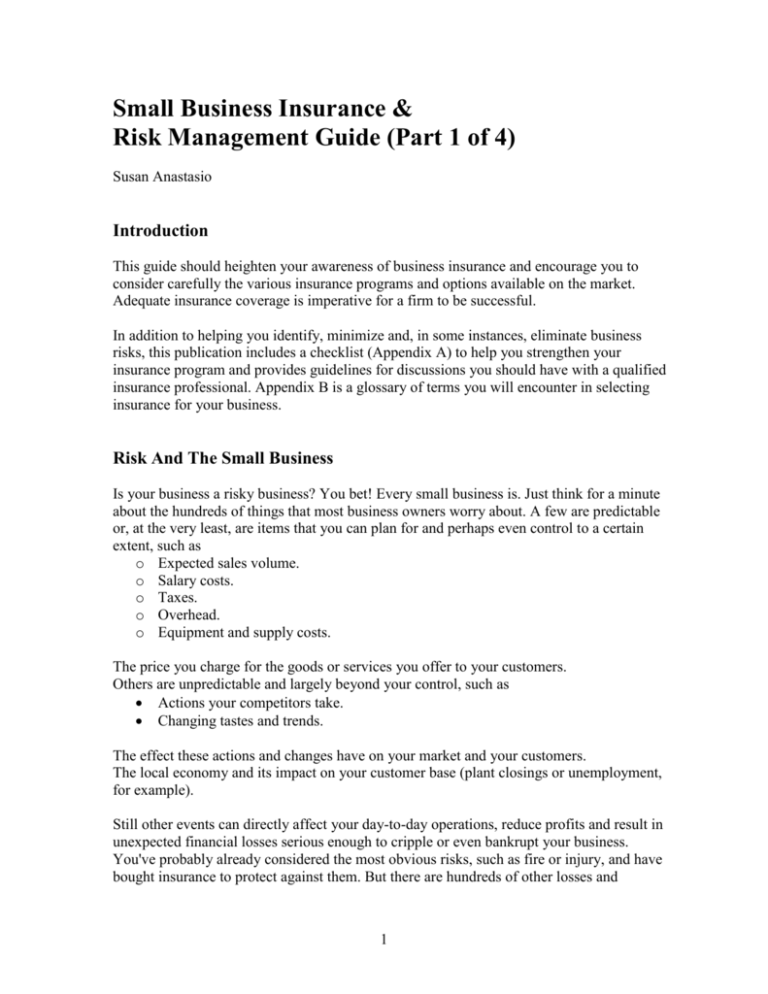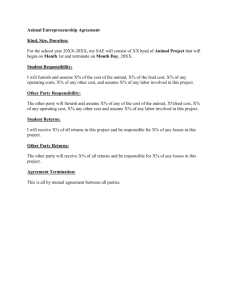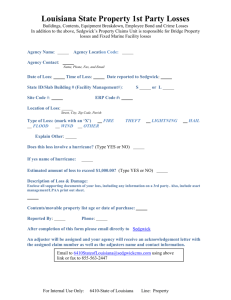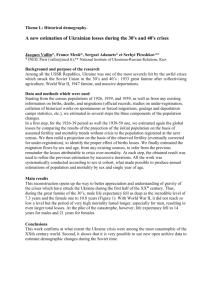Small Business Insurance & Risk Management Guide (Part 1 of 4)
advertisement

Small Business Insurance & Risk Management Guide (Part 1 of 4) Susan Anastasio Introduction This guide should heighten your awareness of business insurance and encourage you to consider carefully the various insurance programs and options available on the market. Adequate insurance coverage is imperative for a firm to be successful. In addition to helping you identify, minimize and, in some instances, eliminate business risks, this publication includes a checklist (Appendix A) to help you strengthen your insurance program and provides guidelines for discussions you should have with a qualified insurance professional. Appendix B is a glossary of terms you will encounter in selecting insurance for your business. Risk And The Small Business Is your business a risky business? You bet! Every small business is. Just think for a minute about the hundreds of things that most business owners worry about. A few are predictable or, at the very least, are items that you can plan for and perhaps even control to a certain extent, such as o Expected sales volume. o Salary costs. o Taxes. o Overhead. o Equipment and supply costs. The price you charge for the goods or services you offer to your customers. Others are unpredictable and largely beyond your control, such as Actions your competitors take. Changing tastes and trends. The effect these actions and changes have on your market and your customers. The local economy and its impact on your customer base (plant closings or unemployment, for example). Still other events can directly affect your day-to-day operations, reduce profits and result in unexpected financial losses serious enough to cripple or even bankrupt your business. You've probably already considered the most obvious risks, such as fire or injury, and have bought insurance to protect against them. But there are hundreds of other losses and 1 liabilities that every small business faces, many of which are overlooked or ignored. Large corporations often employ a full-time risk manager to identify and analyze possible exposures to loss or liability. The risk manager takes steps to protect the firm against accidental and preventable loss and to minimize the financial consequences of unpreventable or unavoidable losses. But most small businesses can't afford the services of a risk manager, even part time, so the business owner often has to take on that responsibility. What Risk Management? Risk management consists of: 1. Identifying and analyzing the events that may cause loss. 2. Choosing the best way to deal with each of these potentials for loss. Exposure To Loss Identifying exposures is a vital first step to risk management; until you know the scope of all possible losses, you won't be able to develop a realistic, cost-effective strategy for dealing with them. It is not easy to recognize the hundreds of hazards or perils that can lead to an unexpected loss. For example, unless you've experienced a fire, you may not realize how extensive fire losses can be. Damage to the building and its contents are obvious, but you should also consider: Smoke and water damage. Damage to employees' personal property and to others' property (e.g., dataprocessing equipment you lease or customers' property left with you for inspection or repair) left on the premises. The amount of business you'll lose during the time it takes to return your business to normal. The potential permanent loss of customers to competitors. Begin the process of identifying exposures by taking a close look at each of your business operations and asking yourself what could cause a loss. If there are dozens of exposures you may find dozens of answers. For each exposure you identify, ask yourself how serious is that loss. This question focuses on the possible severity of each exposure, e.g., what would that loss cost? The purpose here is not to determine the source of replacement or repair funds, but the full cost of the loss. Many business owners use a risk analysis questionnaire or survey, available from insurance agents, as a checklist. Agents can also help analyze your situation; with their expertise and experience, you're less likely to overlook any exposures. 2 In general, most questionnaires and surveys address the potential for Property losses. Business interruption losses. Liability losses. Key person losses. Automobile losses. Injury to employees. Property Losses Property losses stem from one of the following: Physical damage to property. Loss of use of property. Criminal activity. Physical Damage Property damage can be caused by many common perils, such as fire, windstorm, lightning and vandalism. To cope effectively with the possibility of physical damage to property, the business owner should consider more than just damage to or destruction of a building. Contents may be even more susceptible. Manufacturers might lose raw materials and finished goods, and merchants, valuable inventories and fixtures. Any business might lose valuable accounting records, making it difficult to bill or collect from customers. Vital machinery or equipment may become inoperable, and, if replacements can't be found and installed immediately, the business may even be forced to temporarily shut down. (There is a detailed discussion of business interruption later in this booklet.) Loss of Use You can lose the use of your business property for reasons other than physical damage. A government agency can close a manufacturer for violating health and safety regulations. The local health department can close a restaurant because of unsanitary conditions. These are normally uninsurable losses unless caused by an insured peril, e.g., smoke. A gas-main break or a downed utility line may shut down an entire block for a day or more. Criminal Activity Small businesses may also be susceptible to crimes. Burglary and robbery are obvious perils, but so are employee theft, embezzlement and forgery. Merchants, in particular, may need protection against losses caused by forged checks or unauthorized use of credit cards. Obviously, the property loss exposures a bank faces are different from those that a painting contractor, a delicatessen or a bookstore faces. An experienced insurance agent is familiar with the exposures of many different businesses. Just as you rely on an accountant to guide you through the maze of tax regulations and record-keeping requirements, you can rely on an experienced insurance professional to help you identify the exposures to loss that your 3 business may face. Business Interruption Losses You have already seen how a direct loss from fire can shut down a business temporarily. Although insurance provides money for repairing or rebuilding property damaged as a direct result of fire, most policies do not cover indirect losses, such as income that is lost while the business is interrupted for repairs. A special kind of insurance covers indirect losses that occur when a direct loss (that results from a covered peril, such as fire) forces a temporary interruption of business. Business interruption insurance reimburses policyholders for the difference between normal income and the income earned during the enforced shutdown period. Not only is income reduced or cut off completely during such interruptions, but many business expenses continue, such as taxes, loan payments, salaries to key employees, interest, depreciation and utilities. Without income to pay these expenses, the business is forced to dip into reserves. Interruptions in business also often trigger extra expenses. For example, overtime may be authorized to speed the business toward full operation again, or it may reopen with a skeleton staff (additional payroll) in temporary quarters (additional rent) using leased furniture and equipment (additional overhead). These expenses put an added strain on finances at a time when little if any income is being produced. A firm can also buy business interruption insurance to protect against interruptions triggered by direct loss on someone else's property. For example, if a key supplier is shut down by a fire and can't deliver critical raw materials to a manufacturer, the manufacturer's business may be seriously interrupted. Property damage at a key customer's business may have the same effect. If you depend on one firm for most of your volume and that firm is forced to suspend purchasing, you will lose income. Every year hundreds of businesses that carry adequate insurance against direct property losses fail because they are not insured for indirect losses. Don't forget to protect your business against loss of income and unusual expenses that may result if indirect loss forces you to close temporarily. Liability Losses Every business also faces exposure to liability losses. A business may become legally liable (i.e., responsible for payment) for bodily injury suffered by another person or persons, or for damage to or destruction of the property of others. This liability may be the result of A court decision (as in a lawsuit charging negligence). Statutory provisions (such as a state's workers' compensation law). Violation of contract provisions (a contract that makes one party responsible for certain kinds of losses). 4 Public Liability A business may be held liable for injuries or other losses suffered by a member of the general public as the result of the firm's (or its employees') negligence or fault. Examples include A customer in a firm's building trips on a broken step. A defective product causes injury to its user. Improper installation of a product causes injury to a customer. A tenant is held responsible for a third-party injury occurring on the rented property, due to a clause he or she signed agreeing to such responsibility. Your daily paper will provide dozens of other examples. A firm that is found legally liable for harming a third party must pay damages to compensate the injured party. Sometimes the court also imposes punitive damages and, in cases involving violation of statutes designed to protect the community, the court may levy fines in order to discourage future violations. Regardless of who wins or loses a law suit, litigation is time consuming and expensive. No matter how ridiculous or unfounded the suit may be, productive business hours are lost, lawyers must be retained and paid and other related costs must be met while the suit is being contested. Liability to Employees Every state has enacted workers' compensation laws. These laws require most employers to compensate employees for loss of income or medical expenses resulting from work-related disease or injury (except for certain self-inflicted injuries). Should an employee die as a result of a job-related accident or disease, the employee's family also collects a specified amount. Although workers' compensation laws in some states do not apply to all kinds of businesses, a successful private lawsuit may require a normally exempt firm to compensate employees for losses resulting from work-related injury or disease. So far, the exposures we have looked at have all been more or less external to the business. There are, however, several major exposures that have to do with the business itself. Key Person Losses 1. What would happen to your business if an accident or illness makes it impossible for you to work? 2. What if one of your partners or your sales manager suddenly died? 5 Most of us would rather not think about such a "what if," but it is important for you to prepare your business for survival long before a key person dies or is disabled. Serious Illness or Disabled Owner 1. What will the owner's source of income be? How will it be treated for tax purposes? 2. Who will continue the business? What if that person is not qualified or is a minor? Death of an Owner 1. If a will is not in place before the owner's death, will the business close or will someone inherit it? 2. If the owner's life savings are invested in the business, will the surviving family be able to use them wisely? 3. What will be the surviving family's source of income while the future of the business is being decided? 4. If the business is to be sold, where will working capital come from for the transition period? 5. How will the fair market value of the business be determined? 6. Will the fair market value change because of the loss of a key person? 7. If the business forms the bulk of the estate, what are the income and inheritance tax implications for the surviving spouse and heirs? 8. Is there some pre-death strategy that could minimize that tax liability? The answers to these questions can best be determined with the help of your business's planning team: your attorney, accountant and insurance agent. Their expertise in estate planning, financial planning, and current legal and tax codes will help you develop a plan for your business's survival. Death of a Partner Unless the partners have prepared some other binding arrangement, a partnership is dissolved when one-partner dies. The duties of the surviving partner(s) are limited to winding up the affairs of the partnership. Also, the surviving partner(s) will be personally liable for losses that the business's assets are insufficient to cover. Partners may set up agreements for the surviving partner(s) to purchase the deceased partner's interest at a prearranged valuation. Business life insurance on each partner can provide the funds needed to purchase that interest. Who should pay the premium? The business? Each partner? What are the pros and cons of these alternatives? 6 What are the tax implications of each? How would each affect the firm's cash flow? There are many plans and many ways to set up the necessary insurance. Your planning team can suggest a wide range of options compatible with your needs, your firm's cash position and local and federal tax implications. Death of a Major Stockholder In most small incorporated businesses, there are only a few stockholders, and most of them take an active part in running the business. Death of a major stockholder often throws a spotlight on the survivors' differences. Conflict or major personality clashes can seriously threaten the survival of a firm. Dissension also damages employee morale, can lead to a loss of business and may even harm the firm's credit rating. Unless otherwise provided for, the deceased major stockholder's shares will become part of his or her estate. While the estate is being settled, the estate administrator can vote in the deceased stockholder's place. If a controlling interest in the firm is involved, the administrator can name a new board of directors and take over full control of the corporation. 1. What if the heirs decide to get involved in the business? 2. If they decide to retain the stock, will it provide enough income to support them? 3. If the heirs decide to sell the stock, will the other major stockholders have the right of first refusal? 4. Can a plan be set up to allow the surviving stockholders to finance a buy out of the heirs' holdings? Without such a plan, will the remaining stockholders' search for buy out funds have any impact on the firm's credit? Once again, planning is essential. Your attorney, accountant and insurance agent can develop a legally binding strategy to prevent outsiders from unexpectedly coming into the business and to ensure an orderly "hanging of the guard" should a major stockholder die. Loss of a Key Person What would happen if you were to suddenly lose the services of a key person (e.g., a sales manager or the office manager/bookkeeper) because of illness, disability or death? 1. What impact will that person's absence have on sales volume? Costs? Productivity? Efficiency? The firm's credit? 2. How will you reassign duties to cover the missing person's functions? 3. What extra costs will you have to incur to recruit a replacement? 4. How long will it take before the replacement is trained and productive? 7 Small Group Benefits We've already touched briefly on some legally required employee benefits: Social Security. Workers, compensation. Unemployment insurance Temporary disability benefits. Most firms recognize that employees expect basic benefits in addition to those listed above. As an employer, you compete for the most qualified individuals in the local labor pool. Unless you offer at least minimal benefits, attracting and keeping qualified employees may be very difficult You may want to consider offering one or more of the following benefits: Pensions. Group health protection, either as a traditional group plan or in the health maintenance organization format. Health benefits may include life insurance; medical, dental and vision care; prescription drugs and major medical expenses. Other group insurance benefits (life, travel, accidental death and dismemberment, personal, auto and homeowners'). Some plans offer medical self-care and health-promotion programs to encourage employees in healthy lifestyles. Because increased awareness of general health care and preventive medicine fosters greater productivity, reduces absenteeism and increases morale, an employer's insurance costs can be significantly reduced. Presented to you by the Iowa Business Network. http://www.iabusnet.org 8








